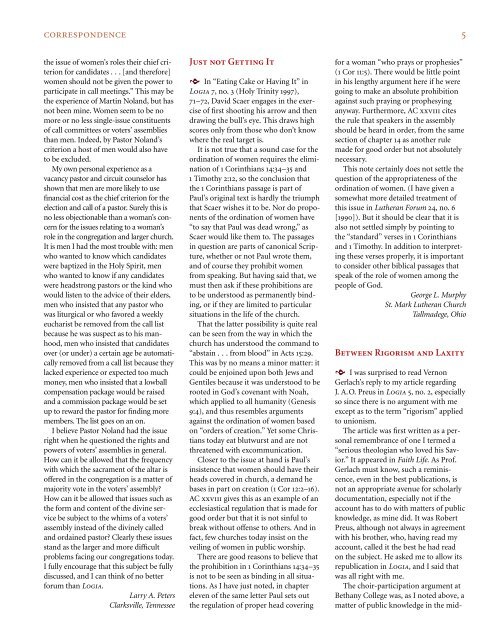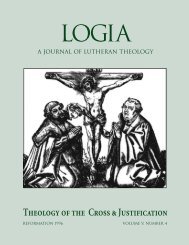Create successful ePaper yourself
Turn your PDF publications into a flip-book with our unique Google optimized e-Paper software.
correspondence 5<br />
<strong>the</strong> issue <strong>of</strong> women’s roles <strong>the</strong>ir chief criterion<br />
for candidates . . . [and <strong>the</strong>refore]<br />
women should not be given <strong>the</strong> power to<br />
participate in call meetings.” This may be<br />
<strong>the</strong> experience <strong>of</strong> Martin Noland, but has<br />
not been mine. Women seem to be no<br />
more or no less single-issue constituents<br />
<strong>of</strong> call committees or voters’ assemblies<br />
than men. Indeed, by Pastor Noland’s<br />
criterion a host <strong>of</strong> men would also have<br />
to be excluded.<br />
My own personal experience as a<br />
vacancy pastor and circuit counselor has<br />
shown that men are more likely to use<br />
Wnancial cost as <strong>the</strong> chief criterion for <strong>the</strong><br />
election and call <strong>of</strong> a pastor. Surely this is<br />
no less objectionable than a woman’s concern<br />
for <strong>the</strong> issues relating to a woman’s<br />
role in <strong>the</strong> congregation and larger church.<br />
It is men I had <strong>the</strong> most trouble with: men<br />
who wanted to know which candidates<br />
were baptized in <strong>the</strong> Holy Spirit, men<br />
who wanted to know if any candidates<br />
were headstrong pastors or <strong>the</strong> kind who<br />
would listen to <strong>the</strong> advice <strong>of</strong> <strong>the</strong>ir elders,<br />
men who insisted that any pastor who<br />
was liturgical or who favored a weekly<br />
eucharist be removed from <strong>the</strong> call list<br />
because he was suspect as to his manhood,<br />
men who insisted that candidates<br />
over (or under) a certain age be automatically<br />
removed from a call list because <strong>the</strong>y<br />
lacked experience or expected too much<br />
money, men who insisted that a lowball<br />
compensation package would be raised<br />
and a commission package would be set<br />
up to reward <strong>the</strong> pastor for Wnding more<br />
members. The list goes on an on.<br />
I believe Pastor Noland had <strong>the</strong> issue<br />
right when he questioned <strong>the</strong> rights and<br />
powers <strong>of</strong> voters’ assemblies in general.<br />
How can it be allowed that <strong>the</strong> frequency<br />
with which <strong>the</strong> sacrament <strong>of</strong> <strong>the</strong> altar is<br />
oVered in <strong>the</strong> congregation is a matter <strong>of</strong><br />
majority vote in <strong>the</strong> voters’ assembly?<br />
How can it be allowed that issues such as<br />
<strong>the</strong> form and content <strong>of</strong> <strong>the</strong> divine service<br />
be subject to <strong>the</strong> whims <strong>of</strong> a voters’<br />
assembly instead <strong>of</strong> <strong>the</strong> divinely called<br />
and ordained pastor? Clearly <strong>the</strong>se issues<br />
stand as <strong>the</strong> larger and more diYcult<br />
problems facing our congregations today.<br />
I fully encourage that this subject be fully<br />
discussed, and I can think <strong>of</strong> no better<br />
forum than Logia.<br />
Larry A. Peters<br />
Clarksville, Tennessee<br />
Just not Getting It<br />
�<br />
In “Eating Cake or Having It” in<br />
Logia 7, no. 3 (Holy Trinity 1997),<br />
71–72, David Scaer engages in <strong>the</strong> exercise<br />
<strong>of</strong> Wrst shooting his arrow and <strong>the</strong>n<br />
drawing <strong>the</strong> bull’s eye. This draws high<br />
scores only from those who don’t know<br />
where <strong>the</strong> real target is.<br />
It is not true that a sound case for <strong>the</strong><br />
ordination <strong>of</strong> women requires <strong>the</strong> elimination<br />
<strong>of</strong> 1 Corinthians 14:34–35 and<br />
1 Timothy 2:12, so <strong>the</strong> conclusion that<br />
<strong>the</strong> 1 Corinthians passage is part <strong>of</strong><br />
Paul’s original text is hardly <strong>the</strong> triumph<br />
that Scaer wishes it to be. Nor do proponents<br />
<strong>of</strong> <strong>the</strong> ordination <strong>of</strong> women have<br />
“to say that Paul was dead wrong,” as<br />
Scaer would like <strong>the</strong>m to. The passages<br />
in question are parts <strong>of</strong> canonical Scripture,<br />
whe<strong>the</strong>r or not Paul wrote <strong>the</strong>m,<br />
and <strong>of</strong> course <strong>the</strong>y prohibit women<br />
from speaking. But having said that, we<br />
must <strong>the</strong>n ask if <strong>the</strong>se prohibitions are<br />
to be understood as permanently binding,<br />
or if <strong>the</strong>y are limited to particular<br />
situations in <strong>the</strong> life <strong>of</strong> <strong>the</strong> church.<br />
That <strong>the</strong> latter possibility is quite real<br />
can be seen from <strong>the</strong> way in which <strong>the</strong><br />
church has understood <strong>the</strong> command to<br />
“abstain . . . from blood” in Acts 15:29.<br />
This was by no means a minor matter: it<br />
could be enjoined upon both Jews and<br />
Gentiles because it was understood to be<br />
rooted in God’s covenant with Noah,<br />
which applied to all humanity (Genesis<br />
9:4), and thus resembles arguments<br />
against <strong>the</strong> ordination <strong>of</strong> women based<br />
on “orders <strong>of</strong> creation.” Yet some Christians<br />
today eat blutwurst and are not<br />
threatened with excommunication.<br />
Closer to <strong>the</strong> issue at hand is Paul’s<br />
insistence that women should have <strong>the</strong>ir<br />
heads covered in church, a demand he<br />
bases in part on creation (1 Cor 12:2–16).<br />
AC xxviii gives this as an example <strong>of</strong> an<br />
ecclesiastical regulation that is made for<br />
good order but that it is not sinful to<br />
break without oVense to o<strong>the</strong>rs. And in<br />
fact, few churches today insist on <strong>the</strong><br />
veiling <strong>of</strong> women in public worship.<br />
There are good reasons to believe that<br />
<strong>the</strong> prohibition in 1 Corinthians 14:34–35<br />
is not to be seen as binding in all situations.<br />
As I have just noted, in chapter<br />
eleven <strong>of</strong> <strong>the</strong> same letter Paul sets out<br />
<strong>the</strong> regulation <strong>of</strong> proper head covering<br />
for a woman “who prays or prophesies”<br />
(1 Cor 11:5). There would be little point<br />
in his lengthy argument here if he were<br />
going to make an absolute prohibition<br />
against such praying or prophesying<br />
anyway. Fur<strong>the</strong>rmore, AC xxviii cites<br />
<strong>the</strong> rule that speakers in <strong>the</strong> assembly<br />
should be heard in order, from <strong>the</strong> same<br />
section <strong>of</strong> chapter 14 as ano<strong>the</strong>r rule<br />
made for good order but not absolutely<br />
necessary.<br />
This note certainly does not settle <strong>the</strong><br />
question <strong>of</strong> <strong>the</strong> appropriateness <strong>of</strong> <strong>the</strong><br />
ordination <strong>of</strong> women. (I have given a<br />
somewhat more detailed treatment <strong>of</strong><br />
this issue in Lu<strong>the</strong>ran Forum 24, no. 6<br />
[1990]). But it should be clear that it is<br />
also not settled simply by pointing to<br />
<strong>the</strong> “standard” verses in 1 Corinthians<br />
and 1 Timothy. In addition to interpreting<br />
<strong>the</strong>se verses properly, it is important<br />
to consider o<strong>the</strong>r biblical passages that<br />
speak <strong>of</strong> <strong>the</strong> role <strong>of</strong> women among <strong>the</strong><br />
people <strong>of</strong> God.<br />
George L. Murphy<br />
St. Mark Lu<strong>the</strong>ran Church<br />
Tallmadege, Ohio<br />
Between Rigorism and Laxity<br />
�<br />
I was surprised to read Vernon<br />
Gerlach’s reply to my article regarding<br />
J. A.O. Preus in Logia 5, no. 2, especially<br />
so since <strong>the</strong>re is no argument with me<br />
except as to <strong>the</strong> term “rigorism” applied<br />
to unionism.<br />
The article was Wrst written as a personal<br />
remembrance <strong>of</strong> one I termed a<br />
“serious <strong>the</strong>ologian who loved his Savior.”<br />
It appeared in Faith Life. As Pr<strong>of</strong>.<br />
Gerlach must know, such a reminiscence,<br />
even in <strong>the</strong> best publications, is<br />
not an appropriate avenue for scholarly<br />
documentation, especially not if <strong>the</strong><br />
account has to do with matters <strong>of</strong> public<br />
knowledge, as mine did. It was Robert<br />
Preus, although not always in agreement<br />
with his bro<strong>the</strong>r, who, having read my<br />
account, called it <strong>the</strong> best he had read<br />
on <strong>the</strong> subject. He asked me to allow its<br />
republication in Logia, and I said that<br />
was all right with me.<br />
The choir-participation argument at<br />
Bethany College was, as I noted above, a<br />
matter <strong>of</strong> public knowledge in <strong>the</strong> mid-

















